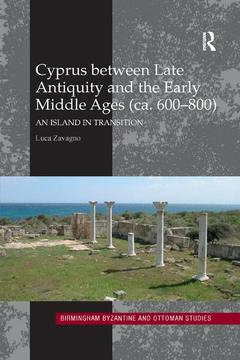Cyprus between Late Antiquity and the Early Middle Ages (ca. 600–800) An Island in Transition Birmingham Byzantine and Ottoman Studies Series
Auteur : Zavagno Luca

Research on early medieval Cyprus has focused on the late antique "golden age" (late fourth/early fifth to seventh century) and the so-called Byzantine "Reconquista" (post-AD 965) while overlooking the intervening period. This phase was characterized, supposedly, by the division of the political sovereignty between the Umayyads and the Byzantines, bringing about the social and demographic dislocation of the population of the island. This book proposes a different story of continuities and slow transformations in the fate of Cyprus between the late sixth and the early ninth centuries.
Analysis of new archaeological evidence shows signs of a continuing link to Constantinople. Moreover, together with a reassessment of the literary evidence, archaeology and material culture help us to reappraise the impact of Arab naval raids and contextualize the confrontational episodes throughout the ebb and flow of Eastern Mediterranean history: the political influence of the Caliphate looked stronger in the second half of the seventh century, the administrative and ecclesiastical influence of the Byzantine empire was held sway from the beginning of the eighth to the twelfth century. Whereas the island retained sound commercial ties with the Umayyad Levant in the seventh and eighth centuries, at the same time politically and economically it remained part of the Byzantine sphere. This belies the idea of Cyprus as an independent province only loosely tied to Constantinople and allows us to draw a different picture of the cultural identities, political practices and hierarchy of wealth and power in Cyprus during the passage from Late Antiquity to the early Middle Ages.
1. Mattia Pascal and the Name of Cyprus
2. Seeing the Unseen: A Brief Overview of Cypriot Historiography
3. The Mousetrap of Methodology
4. A History of Cyprus in the Early Middle Ages
5. Urban vs. Rural: The Many Sides of the Cypriot Coin
6. An Insular Economy in Transition
7 Aftermath and Conclusions
Bibliography
Index
Luca Zavagno received his BA degree in History from the University Ca’Foscari, Venice; he completed his PhD studies at the University of Birmingham on the society, culture, economics and politics of Byzantine cities. He is Assistant Professor in the Department of History at Bilkent University. Dr. Zavagno is the author of many articles on the Byzantine and early Medieval Mediterranean and of the co-edited volumes Islands of Eastern Mediterranean: A History of Cross Cultural Encounters and People (2014), Goods on the Move: Merchants, Networks and Communication Routes in the Medieval and Early Modern Era (2016) and of Cities in Transition: Urbanism in Byzantium between Late Antiquity and the Early Middle Ages (2009).
Date de parution : 12-2019
15.6x23.4 cm
Date de parution : 05-2017
15.6x23.4 cm
Thème de Cyprus between Late Antiquity and the Early Middle Ages... :
Mots-clés :
Karpas Peninsula; Arab Raids; Byzantine History; Saranda Kolones; Late Antiquity; Agia Varvara; Medieval Cyprus; Sigillographic Evidence; Khirbat Al Mafjar; Nea Paphos; Seventh Ecumenical Council; Agia Paraskevi; Arab Byzantine Coinage; Constantine Porphyrogennetos; Early Eighth Century; Agios Georgios; GWW; Mesaoria Plain; Byzantine Mediterranean; Cypriot Cities; Lead Seals; Globular Amphorae; Late Seventh; Early Christian Basilicas; Cypriot Church; Mattia Pascal; Leo III; Cypriot Historiography



